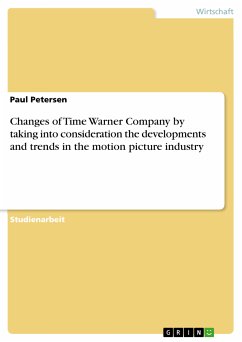Studienarbeit aus dem Jahr 2017 im Fachbereich BWL - Unternehmensführung, Management, Organisation, , Sprache: Deutsch, Abstract: The Motion Picture industry is a continuously and rapidly changing industry due to technical advancements or industry trends guiding the film industry into a certain direction. Particularly innovation and the power of customer demand are the main triggers for the swaying trends in the film industry. The steadily growing motion picture industry is becoming more and more important based on the popularity across the population. In 2016 the global box office revenue reached its peak of about 38 billion U.S. dollars and experts are now predicting a further increase to about 50 billion U.S. dollar in 2020. Nowadays the motion picture industry belongs to one of the fastest growing industries around the world while India is the largest film market in the world, followed by China and the U.S. Hence it is absolutely necessary for companies that are engaged in the film industry to react according to external trends efficiently and in an adequate manner in order to remain competitive. This paper begins with a general historic overview in order to give an insight into the most important events in the motion picture industry. Afterwards there will be a theoretical part including a general description of the function of merger and acquisitions that have been implemented in the particular company and motion picture example. In the main part the paper addresses the major changes the motion picture industry is surrounded by. These can be on the one hand developments that has been emerged over time or on the other hand trends that are currently shifting the motion picture into a certain direction. Subsequently there will be a description of the Time Warner profile and its most recent data. Based on the changing industry trends in the motion picture, Time Warner as a company has to adapt its business operations according to the industry environment. These company shifts are highlighted in the following and analyzed with a special focus on the internal reorganization process of the company. At the end there will be a summary about the essence of the text and a review of the most important changes that have been made in the motion picture industry and at Time Warner in particular.
Dieser Download kann aus rechtlichen Gründen nur mit Rechnungsadresse in A, B, BG, CY, CZ, D, DK, EW, E, FIN, F, GR, HR, H, IRL, I, LT, L, LR, M, NL, PL, P, R, S, SLO, SK ausgeliefert werden.









